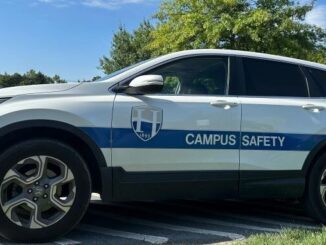By Hilary Lawch
The core curriculum at Hood is being fundamentally revised for the first time in 22 years by a task force of four professors convened by Dr. Katherine Conway-Turner, provost and vice-president of academic affairs.
If the proposed changes are approved by the Faculty Senate, the revision will become policy for a new incoming class and will not directly affect current students.
The revision – which introduces a stronger focus on writing, quantitative literacy and global perspectives – proposes a mandatory first-year seminar, a social justice course in the civilization section of the core, one writing-intensive course in each major, and a re-organization of the upper core requirements.
“I wanted the core to respond to the needs of today’s students,” Conway-Turner said.
When the core revision was formally presented at the Senate’s monthly meeting on Oct. 7, some faculty members expressed concern at certain aspects of it.
“We’re going from a core that looks pretty good to one that is confused – and confusing,” Dr. Mark Sandona, chair of the English department, said. “People are concerned that the proposed core will place an undue burden on students.”
In the Friday, Nov. 11, faculty meeting, it was decided that the first-year seminar, arguably the most controversial part of the proposal, would stay in the proposed core curriculum (36 approved, 34 opposed, eight abstained).
The first-year seminars will contain no more than 15 freshman students each and will not count toward a major. The downside to this will be the likelihood of fewer class sections available for upperclassmen, as well as more hours for professors to teach, since it will create at least 22 new sections in the fall semester.
In reference to the first-year seminar, Doug Raftery, president of the Student Government Association (SGA), said, “The [SGA] Executive Board does believe that it is a good idea in theory, but we do not believe that there has been enough time to be able to put together a first-year seminar without making the majority of our students and faculty happy.”
“Faculty are really going to have their hands full with this first-year seminar,” Raftery added. “The pressure will be put on the English department, and staffing just isn’t there for it.”
“It’s completely unrealistic,” Sandona said of the freshman seminar.
“Adding a new requirement to the core like a first-year seminar would almost require that the faculty teach seven courses a year,” he said, referring to the recent debate over moving from an 18-credit teaching load to a 21-credit teaching load, an administrative proposal that the faculty roundly rejected last spring.
Some upperclassmen are skeptical of the value of a first-year seminar.
“I really don’t think I like the freshman seminar,” junior Olivia Wolz said. “I understand why they would want to do it, but I don’t think it would be beneficial. I’ve had friends who have had similar classes at their universities, and they saw it as a hassle. They hated going to it.”
Junior Bridgitte McColligan has heard similar thoughts from friends at different schools.
“From what I know about these programs from other colleges, these classes are pointless and the students do not try in the class, because they feel that it is just like a high school class.”
McColligan also said that there are already classes that assist those freshmen who require extra help, and she suggested that perhaps the task force consider keeping this course for those who need it, rather than requiring it for all incoming freshmen.
As for the possibility of professors having to teach extra classes, Wolz said, “If the [professors] are forced to do these without extra pay, that’s not very fair for them.”
In a written statement, the task force said that the first-year seminar was a way to address the belief held by many faculty members that writing skills need to be improved.
“Many of the individuals and departments with which we met stressed the importance of helping students become better writers and more critical thinkers and readers,” the statement read. “We believe that the first-year seminars, all of which will be reading- and writing-intensive, will help students to cultivate skills that will make them successful in their college classes and in their future careers.”
In their research, the task force found that many other universities that mandate a first-year seminar have found it to be a recruiting and retention tool.
Raftery explained that SGA is concerned with how the first-year seminar could limit the opportunities for upperclassmen, since multiple sections of higher-level courses would be combined in order to make room for the first-year seminar.
“If there was a class, such as a 200-level philosophy course, and it was offered once a semester during the year, and there were 12 students of the possible 25 who occupied that course each semester, than the two sections would be combined into one semester,” he said. “That 200-level philosophy course would still be offered, but only in the spring, and it would contain 24 students. The [SGA executive] board is worried about how this will hurt class size of upperclassmen because there is so much focus on the first-year seminar and creating room for it regarding professors.”
The proposal of a social justice course in the upper core has been met with less criticism by some students.
“If you can improve your own understanding of the world and how others live, why not?” Wolz said.
Senior Sara Winand agreed.
“Social justice is a good addition because that’s important for the time we live in,” she said.
Raftery and the other SGA members have been working to find out how the student body feels on this matter.
“The [executive] board has thoroughly looked through the proposed core curriculum as a group and feel very comfortable putting this stance out as student representatives,” he said. “We want what is best for the college.”
The task force consists of Dr. Karen Hoffman, associate professor of philosophy; Dr. Kerry Strand, chair of the department of sociology; Dr. Susan Ensel, professor of chemistry; Dr. Sang Kim, associate professor of economics and management; and Dr. Anne Derbes, professor of art.
Catherine Collins contributed reporting.




Be the first to comment